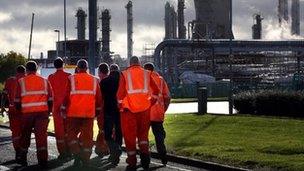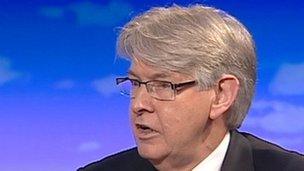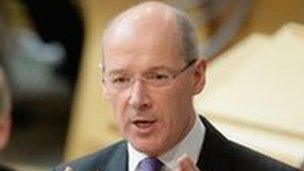Grangemouth dispute: The key players
- Published
There are five chief characters involved in the Grangemouth dispute. Who are they and what are their views?
Jim Ratcliffe, chief executive, Ineos, owner of Grangemouth

Jim Ratcliffe founded Ineos 15 years ago
Sixty-year-old Jim Ratcliffe trained as a chemical engineer, before becoming an accountant and entrepreneur.
Mr Ratcliffe is one of the 100 richest men in the the UK, according to the latest Sunday Times Rich List.
Another rich list, by the US publication Forbes, has him in the dollar billionaire category, with a fortune of $1.1bn (£680m).
A global businessman, the company he founded operates in 11 countries.
His company is a private one, allowing him to keep a lower profile than public company heads and he is known to be publicity shy, rarely giving interviews.
However, he did comment at the weekend, saying the fate of the Grangemouth was in the hands of its staff: "This is not a bluff. The clock is ticking.
"Grangemouth could have a future but that is absolutely in the hands of the workers. If we go down the wrong road, then I'm afraid this story will not have a happy ending."
Stephen Deans, Scottish Unite chairman

Stephen Deans works at the Ineos plant
Perhaps the key figure in the dispute, Stephen Deans, is the convener for Unite in Scotland.
Unite started its industrial action earlier this month over what it says is the victimisation of Mr Deans, who has worked at the Ineos plant for more than 20 years.
Ineos accused him of contravening company policies as part of his work as former chair of the Labour Party in Falkirk.
He was suspended from Ineos in the summer in connection with his Labour Party activities, essentially accused of campaigning on work premises.
His suspension soured labour relations between management and union members, a large number of whom were angry at his treatment.
Mr Deans had recruited a number of Unite members from the Ineos workforce to the local Labour branch, where the selection of a new parliamentary candidate was taking place.
His activities attracted the suspicion of Labour Party head office.
An investigation into whether electoral rigging was taking place cleared Unite.
Pat Rafferty, Unite Scottish secretary

Pat Rafferty has accused Ineos of holding workers hostage
Unite's Scottish Secretary Pat Rafferty has been at the heart of the story since the situation between the company and the union flared up in the summer.
He headed the union's delegation during talks with the company at conciliation service Acas last week, which failed to find a solution to the dispute.
He has accused the company of playing "Russian roulette" about closing down the site and claimed the company was holding its workforce hostage.
Mr Rafferty sees the plant's future in the hands of a new owner, saying: "We do need a responsible owner... and we would support the Scottish government in that quest."
Michael Connarty, MP, Falkirk East and Linlithgow

Michael Connarty: MP for the area since 1992
Highly supportive of the workforce, Michael Connarty, the Falkirk East and Linlithgow MP, has called Mr Ratcliffe the "equivalent of a Russian oligarch".
He has gone so far as to tell the House of Commons there may have been "some sort of collusion" between the government and Ineos to enable the company, he said, to "break the workforce".
Mr Connarty, whose constituency includes Grangemouth, was a special needs teacher before becoming an MP in 1992.
His concerns about Grangemouth were evident right from the start.
He used his maiden speech in the House of Commons in May 1992 to raise concerns about strength of the petro-chemical industry at Grangemouth.
John Swinney, Scottish finance secretary

John Swinney believes a new buyer can be found
Scotland's Finance Secretary John Swinney has been concerned for weeks about the situation at Grangemouth because of its importance to the Scottish economy.
He says if the whole plant was to close it would have a "very significant effect and a damaging effect" on the nation and he is active in the search for a new owner for Ineos.
He told the BBC: "I don't think it will come as any surprise to anyone that the government is looking for alternative options.
"We have certainly had discussions with other players and the Scottish government will engage in any discussions that are helpful to ensure Grangemouth can continue."
He did add though that government ownership was not an option, despite the company's importance to the Scottish economy.